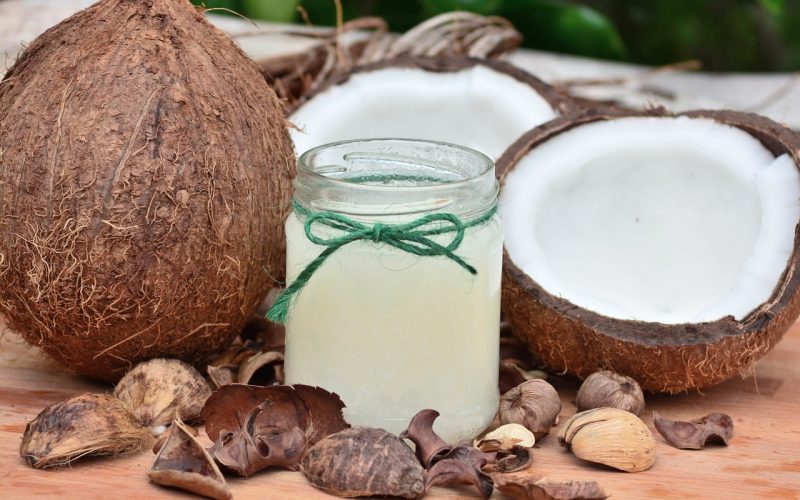Many recipes call for coconut oil, but this food can be challenging in many parts of the country.
Coconut oil tends to be expensive, and it’s not always easy to locate in stores that don’t specialize in health foods or natural products.
But plenty of substitutes for coconut oil in baking can work just as well or better in baking recipes that call for it!
Here are the best substitutes for coconut oil in baking that you can use in your kitchen today!
1. Butter
You can use butter as a 1:1 substitute for coconut oil in baking. However, butter is a dairy product, so it won’t work as a substitution if you’re making a dairy-free recipe.
Also, because butter is solid at room temperature, your baked goods will likely have a denser texture. Finally, butter adds richness and flavor to baked goods, so coconut oil may be the way to go if you want to make a healthier recipe.
2. Ghee
Ghee is a type of clarified butter popular in Indian cuisine. It has a high smoke point, which makes it ideal for baking. Additionally, ghee imparts a rich flavor to baked goods. Ghee is good if you’re looking for a substitute for coconut oil in baking.
3. Olive Oil
When it comes to heart health, olive oil is the clear winner. It’s lower in saturated fat than coconut oil and contains beneficial compounds like polyphenols.
Olive oil can be used in baking in a 1:1 ratio in place of coconut oil. The results will be slightly different—your baked goods will be moister and have a different flavor. But olive oil is an excellent choice if you’re looking for substitutes for coconut oil in baking.
4. Peanut Butter
Peanut butter is an excellent substitute for coconut oil in baking. It has a similar consistency and can be used in the same proportions.
Peanut butter adds a nutty flavor to baked goods, so keep that in mind when using it as a substitute.
In baking, you can also use other nut jars of butter, like almond or cashew butter, as substitutes for coconut oil.
5. Avocado
Avocados are great substitutes for coconut oil in baking. They’re high in healthy fats and add a delicious creaminess to baked goods. Plus, they’re a great source of fiber and vitamins.
To substitute avocado for coconut oil, use a 1:1 ratio. One cup of avocado will replace one cup of coconut oil in any recipe. Try this avocado chocolate cake recipe!
6. Almond Butter
Almond butter is an excellent substitute for coconut oil in baking. It has a similar consistency and can be used similarly to coconut oil. Plus, it’s a healthy alternative to coconut oil.
You can use almond butter in any recipe that calls for coconut oil. Substitute it in a 1:1 ratio.
So, if the recipe calls for 1 cup of coconut oil, use 1 cup of almond butter instead.
Other substitutes for coconut oil in baking include canola or vegetable oils like soybean, sunflower, or corn.
7. Olive Oil
Olive oil is also a good option as long as you know it has a distinct flavor. If you’re trying to reduce fat intake but still want more flavor than plain old vegetable oil, try substituting olive oil with avocado or macadamia nut oils.
8. Sunflower Seed Butter
Sunflower seed butter is an excellent alternative to coconut oil when baking. It has a similar consistency and can be used as a one-to-one recipe replacement.
Sunflower seed butter is also a good source of vitamin E and antioxidants, making it a healthier substitute for coconut oil in baking than coconut oil.
When substituting sunflower seed butter for coconut oil, use the same amount called for in the recipe.
9. Grapeseed Oil
Grapeseed oil is an excellent substitute for coconut oil in baking. It has a similar flavor and texture and is also a healthy option.
You can use grapeseed oil in any recipe for coconut oil, and you’ll get great results.
Here are a few tips for using grapeseed oil in baking:
- When substituting grapeseed oil for coconut oil, use the same amount called for in the recipe.
- Grapeseed oil has a high smoke point, so it’s ideal for baking.
- Grapeseed oil will give your baked goods a subtle grape flavor. If you don’t want this flavor, you can substitute another oil type, like olive or vegetable oil.
10. Sunflower Oil
Sunflower oil has a similar smoke point to coconut oil, making it a good choice for baking. Plus, it has a neutral flavor that won’t affect the taste of your food.
If you’re looking for a healthy option, sunflower oil is a good choice since it’s high in vitamin E and low in saturated fat.
In baking, you can also use other oils like olive or canola oil as substitutes for coconut oil. Just choose an oil with a similar smoke point so your food doesn’t taste burnt.
11. Beef Tallow
Beef tallow is a rendered form of beef fat. It’s solid at room temperature and has a high smoke point, making it ideal for baking.
Plus, it imparts a delicious flavor to baked goods. Beef tallow is an excellent option if you’re looking for substitutes for coconut oil in baking.
Here are some tips for using beef tallow in baking:
- Use it in place of coconut oil in recipes that call for melted or liquid oil.
- Use chilled or frozen beef tallow if a recipe calls for solid coconut oil.
- Grate the beef tallow into small pieces before adding it to your recipe.
12. Hazelnut Oil
Hazelnut oil has a similar smoke point to coconut oil, making it a good choice for baking. Its nutty flavor can enhance the flavor of baked goods.
When substituting hazelnut oil for coconut oil, use the same amount called for in the recipe.
13. Macadamia Oil
Macadamia nut oil is an excellent substitute for coconut oil in baking. It has a similar flavor and texture but is lighter and less greasy.
Plus, it’s a good source of healthy monounsaturated fats. If you’re looking for a healthier option, try using macadamia nut oil instead of coconut oil in your recipes.
Unlike coconut oil, which is high in saturated fat and thus more likely to increase LDL cholesterol levels (the bad cholesterol), macadamia nut oil is full of healthy monounsaturated fats that help lower cholesterol levels.
With a taste similar to coconut oil and the same light texture, this alternative may be just what you’re looking for!
14. Hemp Seed Oil
The hemp seed oil has a similar smoke point to coconut oil, making it a good substitute for baking.
This oil is also a good source of omega-3 fatty acids, promoting heart health and reducing inflammation.
Unlike coconut oil, hemp seed oil is not solid at room temperature. This means that it may not be suitable for recipes that require firm dough or a flaky finished product.
However, hemp seed oil can be used instead of coconut oil in many baking recipes with little to no modifications.
Use the same amount of hemp seed oil as coconut oil, and your baked goods will be just as delicious!








